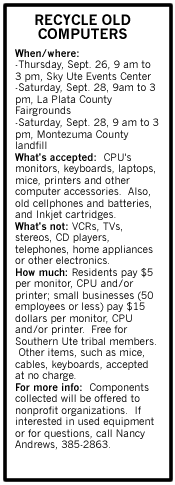Despite study indicating downturn, local
experts say participation still strong
by
Missy Votel
 Despite a recent nationwide study that found aluminum-can recycling
at its lowest rate in 15 years, local experts say the trend has
bypassed La Plata County for now.
Despite a recent nationwide study that found aluminum-can recycling
at its lowest rate in 15 years, local experts say the trend has
bypassed La Plata County for now.
“I don’t see a drop in participation
at all; we’re still doing really well,” said Nancy
Andrews, recycling coordinator for the city of Durango, which
has offered a free residential curbside program since 1990.
Although the city reported a slight decline
in material recycled between 2000 and 2001, from 2,630 tons to
2,512, those numbers represent a steady climb over previous years.
By comparison, only 365 tons were recycled in 1996, the first
year figures were available.
Likewise, Mark Thompson, owner of Phoenix
Recycling, a private, locally-owned company that collects waste
and recycling materials in La Plata County, said interest has
been strong in the 1BD years he’s been in business.
“Response has been good,” he
said. “We’re growing rapidly.”
 The
study chronicling the decline was conducted by the Container Recycling
Institute, a Washington-D.C.-based nonprofit research group that
tracks recycling trends and rates. According to the study, in
2001, 49.2 percent of all aluminum cans bought in the United States
were recycled. It was the lowest rate since 1987 and down from
an all-time high of 65 percent in 1992. That drop amounted to
more than 50.7 billion wasted cans in 2001, according to the group. The
study chronicling the decline was conducted by the Container Recycling
Institute, a Washington-D.C.-based nonprofit research group that
tracks recycling trends and rates. According to the study, in
2001, 49.2 percent of all aluminum cans bought in the United States
were recycled. It was the lowest rate since 1987 and down from
an all-time high of 65 percent in 1992. That drop amounted to
more than 50.7 billion wasted cans in 2001, according to the group.
“The energy value of those trashed
cans was equivalent to 16 million barrels of crude oil or enough
energy to supply 2.7 million American homes with electricity for
a year,” said Pat Franklin, executive director of the Container
Recycling Institute.
The reasons for the downturn are twofold, says study author, Jennifer
Gitlitz. She blames the trend on an increasingly convenience-oriented
lifestyle as well as diminishing financial incentives.
“The value of a pound of aluminum cans
to folks who collect scrap cans for cash hasn’t changed
much in the past decade, but the value of the dollar has declined,”
she said. “People are also drinking more beverages on the
go, away from the convenience of residential recycling bins.”
Perhaps even more frustrating is that rates
are declining despite an increase in curbside recycling programs
across the country, according to the group. This has led some
cities to question whether free curbside recycling is prudent.
“Nationwide, there are certain areas
where programs are being rethought and restructured,” said
Thompson, who worked in the industry in California for a number
of years before opening his business here.
Possibly the highest-profile case is New
York City, where Mayor Michael Bloomberg said he wants to suspend
metal, glass and plastic recycling to help offset a $5 billion
budget shortfall. Closer to home in Denver, one city official
recently proposed charging for curbside pickup, a move many fear
could mean the kiss of death for curbside recycling in the city.
Thompson, who charges between $23.95 and
$27.95 a month for his service, admits fees are not such a bad
idea, and that a free program is a “lofty goal” for
municipalities. The way he sees it, “free” recycling
is a bit of a misnomer. The process costs money; it’s just
a matter of how it’s paid for, he said.
“The city may have free recycling,
but people pay for garbage,” he said. “The recycling
program is never free, it’s just paid out of another fund.”
However, he said requiring a recycling fee
can be difficult.
“Since it’s free, people have
it in the back of their heads that it should be free,” he
said.
Andrews, with the city, says there are no
plans right now to institute a fee in Durango, and that the city
is looking, instead, at ways to weather the fickle commodities
market.
“We have good years and bad,”
she said of the program, which is subsidized by the city. Last
year, the program ended up about $65,000 in the red, whereas the
year before, it generated about $61,000.
“The glass market has been depressed
for years, but the prices for paper were up, but now those are
coming back down,” she said. “There’s always
something that we have to deal with.”
To cope with the faltering glass market,
particularly green and clear glass, the city bought a glass crusher
and is working to sell the crushed glass locally.
“We have been working with a few landscapers
who use it as mulch or pea gravel, and setting flagstone,”
she said. “There’s also a sandblaster who’s
been trying it out.”
In addition to diversifying uses for its
existing stock, the city is now looking at plans for plastics
recycling and will be holding computer recycling later this month.
Although computer recycling will cost $5, Andrews said she hopes
people will weigh the relatively small cost against the larger
environmental benefits.
“Computers have a lot of nasty stuff
in them that contaminates the water,” she said.
Thompson said instilling this kind of thinking
in people – that recycling is not just good for keeping
waste out of the landfills but reducing pollution – is perhaps
his biggest challenge.
“The hard part is getting people to
understand the environmental benefits,” he said.
To help remedy that, Thompson said he sends
his customers a quarterly newsletter, to “keep them up to
speed on what’s going on.”
And he said it seems to be working.
“There’s definitely an education
curve,” he said. “I’ve seen people go from recycling
just 5 percent of their waste to 25 percent six months down the
road,” he said. “I even have some people who recycle
way more than 50 percent of their garbage.
As for area residents following suit with
the rest of the nation and losing interest in recycling, Thompson
is optimistic something like that will never happen.
“I think there are enough people in
the area that care about the environment and want to do the right
thing.”
|

